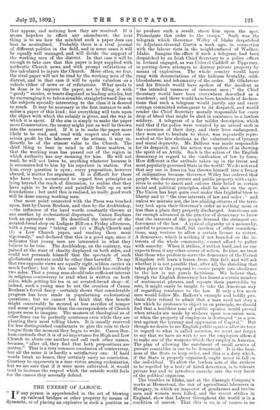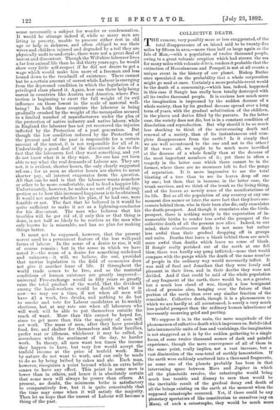THE UNREST OF LABOUR.
" IF any person is apprehended in the act of blowing up railroad bridges or other property by means of dynamite, or of placing an explosive in such a position as to produce such a result, shoot him upon the spot. Promulgate this order to the troops." Such was the telegram which Governor Willey of Idaho despatched to Adjutant-General Curtis a week ago, in connection with the labour riots in the neighbourhood of Wallace, Idaho. Imagine the effect if such a telegram had been despatched. by an Irish Chief Secretary to a police officer in Ireland engaged, as was Colonel Caddell at Tipperary, in putting down attempts to destroy private property by means of explosives. The whole country would have rung with denunciations of the hideous brutality, cold- bloodedness, and inhumanity of the order. Mr. Gladstone and his friends would have spoken of the incident as " the intended massacre of innocent men ; " the Chief Secretary would have been everywhere described as a murderer ; and there would have been hundreds of declara- tions that such a telegram would justify any and every outrage committed subsequent to its despatch, and would render the Chief Secretary morally responsible for every drop of blood that might be shed in resistance to a lawless soldiery. A telegram of a far milder description, which said that if the police were resisted by an armed mob in the execution of their duty, and their lives endangered, they were not to hesitate to shoot, was repeatedly repre- sented at the late elections as the culmination of tyranny and moral depravity. Mr. Balfour was made responsible for its despatch, and his action was spoken of as showing the spirit of an Attila. Such is the action of the English democracy in regard to the vindication of law by force. How different is the attitude taken up in the freest and most popularly governed State in the world ! We do not read that any one in Amei ica has thrown himself into a frenzy of indignation because Governor Wiley has ordered that people who destroy private and public property with explo- sives in order to assert and enforce their belief in certain social and political principles, shall be shot on the spot, The Union has kept quite cool under this frightful blow to liberty and to " the true interests of law and order ; " and unless we mistake not, the law-abiding citizens of the terri- tory look upon their Governor's order as nothing more or less than a plain duty properly discharged. Americans are far enough advanced in the practice of democracy to know that the interests of the people demand the strongest en- forcement of the law. A cynical oligarchy or a monarchy, careful to preserve itself, but careless of other considera- tions, may venture to allow a certain license to rioters. A democracy, which is nothing if not founded on the in- terests of the whole community, cannot afford to palter with anarchy. When it strikes, it strikes hard, and no one expects from it any other course of action. In time, we trust that those who profess to serve the democracy of the United Kingdom will learn a lesson from this fact, and will ask whether it is not possible that, after all, the shrieking that takes place at the proposal to coerce people into obedience to the law is not purely factitious. We believe that, though the English democracy has learnt a certain number of sentimental phrases, and repeats them parrot-like by rote, it might easily be taught to take the American way of regarding resistance to the law. If only a few more men would follow Mr. Balfour's example and boldly pro- claim their refusal to admit that a man need not obey a law which he professes to object to on principle, we should find that a healthier tone of public opinion would prevail when attacks are made by strikers upon non-union men, or when the property of employers is destroyed " as a pro- test against the tyranny and oppression of Capital." But though we desire to see English public opinion alter its tone in regard to what is called coercion, we must not forget to say that we have no wish to see the employers allowed to make use of the weapons which they employ in America.
The plan of allowing the enrolment of small armies of private constables is one to be denounced. It is the busi- ness of the State to keep order, and this is a duty which, if the State is properly organised, ought never to fall on the individual. To allow the lawless acts of the strikers to be repelled by a body of hired detectives, is to tolerate private war and to introduce anarchy into the very heart of the political organism. The troubles in Idaho, and at the Carnegie Company's works at Homestead, the riot of agricultural labourers in Hungary, in which an inspector of gendarmes and twelve men and women were killed, and the recent strikes in England, show that Labour throughout the world is in a condition of unrest. That this is so, is of course in no sense necessarily a subject for wonder or condemnation. It would be strange indeed if, while so many men are living in poverty, unable to procure either rest in old age or help in sickness, and often obliged to see their wives and children injured and degraded by a toil they are physically unfit to undertake, there were not a great deal of unrest and discontent. Though the Wiltshire labourer lives a far less animal life than he did thirty years ago, he would show very little self-respect if he did not desire to get a wage which would make him more of a freeman and less bound down to the treadmill of existence. There cannot but be a certain amount of unrest while Labour is emerging from the depressed condition in which the legislation of a privileged class placed it. Again, how can there help being unrest in countries like Austria and America, where Pro- tection is beginning to exert the full weight of its evil influence on those lowest in the scale of material well- being ? In both these countries the labourer is being gradually crushed by the weight of the monopolies secured to a limited number of manufacturers under the plea of the protection of native industry and native labour, while in England the labourer has not yet recovered the injuries inflicted by the Protection of a past generation. But though the low condition induced by the Protection of the present and of the past is responsible for a certain amount of the unrest, it is not responsible for all of it. Undoubtedly a good deal of the discontent is due to the fact that the labourers feel they want something, and yet do not know what it is they want. No one has yet been able to say what the real demands of Labour are. They are not, it is evident, shorter hours, the only clearly suggested reform ; for as soon as shorter hours are shown to mean shorter- pay, all interest evaporates from the question. All that can be said is that the labourer wants somehow or other to be more comfortable, and to lead a happier life. Unfortunately, however, he makes no sort of practical sug- gestion as to how this increased happiness is to be obtained. It would not matter whether his plan, if he had one, were feasible or not. The fact that he believed in it would be quite sufficient to make it act as a lightning-conductor for his discontent. The man who believes that his troubles will be got rid of, if only this or that thing is done, is not half so likely to be restless as the man who only knows he is miserable, and has no plan for making things better.
It must not be supposed, however, that the present unrest need be a permanent feature of the less well-paid forms of labour. In the sense of a desire to rise, it will of course remain ; but in the sense in which we have noted it—the sense of a desire for something undefined and unknown—it will, we believe, die out, provided that unwise legislation in the field of economics does not give it another ]ease of life. If throughout the world trade comes to be free, and so the material conditions of human existence are greatly improved— universal Free-exchange would in fifty years so greatly raise the total product of the world, that the dividend among the hand-workers would be double what it is now—we may see a time, if not when all men will have £1 a week, free drinks, and nothing to do but to smoke and vote for Labour candidates at bi-weekly elections, but at any rate one when all labourers who will work will be able to put themselves outside the reach of want. More than this cannot be hoped for, since to get more than this the majority of men will not work. The mass of men, after they have provided food, fire, and shelter for themselves and their families, prefer rest or idleness, whichever it may be called, in accordance with the sentiment of the day, to harder work. In theory, all men want ten times the income they happen to have, but very few would accept the tenfold income at the price of tenfold work. Men by nature do not want to work, and can only be made to do so by being bribed by cakes and ale. Each man, however, recognises a point beyond which an extra bribe ceases to have any effect. This point in some men is lower than in others, and hence it is absolutely certain that some men will always be poorer than others. At present, no doubt, the minimum bribe is satisfactory to comparatively few, but it is quite conceivable that the time may come when it will satisfy the majority. Then let us hope that the unrest of Labour will become a thing of the past.



































 Previous page
Previous page